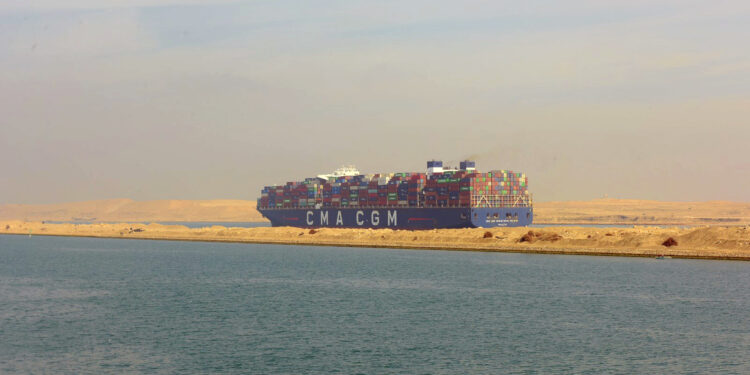The volume of trade through the Suez Canal – which is suffering as a result of attacks by the Yemeni Houthi group in the Red Sea – has decreased by 45% during the past two months, according to what the United Nations announced, which is concerned about the repercussions on global trade as a whole.
Jan Hoffman, an official at the United Nations Trade and Development Organization (UNCTAD), said in a press conference yesterday, Thursday, “We are very concerned about the attacks against shipping in the Red Sea (…) which increase trade disruptions linked to geopolitics and climate change.”
According to UNCTAD, the volume of trade through the Suez Canal decreased by 45% in the past two months, due to Houthi attacks that prompted ship owners to suspend transit through the Red Sea.
The weekly number of container ship crossings decreased by 67% year on year, according to what was reported by Agence France-Presse.
UNCTAD reported that the number of ships that crossed the Suez Canal decreased by 39% compared to the beginning of last December, according to Reuters.
Since last November, the Houthi group has been targeting ships in the Red Sea and the Gulf of Aden linked to Israel, in solidarity with the people of the Gaza Strip, which has been subjected to an Israeli war since last October 7.
Jan Hoffmann stressed that trade disruptions in the Red Sea raise concerns, given that more than 80% of global trade in goods takes place by sea and because “other important routes are also under pressure.”
Steady decline
Container shipments through the Suez Canal decreased by 82% in the week ending January 19 compared to early December, and liquefied natural gas shipments also declined further, while dry bulk cargo shipments witnessed a smaller decline while traffic increased.
Little crude oil tankers.
Between 12 and 15% of global trade and between 25 and 30% of container traffic pass through the Suez Canal.
More than two weeks ago, the head of the Suez Canal Authority, Osama Rabie, said that the canal’s dollar revenue had decreased by 40% since the beginning of the year compared to 2023, affected by the Houthi attacks.
The Egyptian official stated at the time that ship transit traffic declined by 30% in the period from the first of January to the 11th of the same month on an annual basis.
What about food prices?
Transit through the Black Sea was disrupted after the Russian-Ukrainian war, leading to global food prices rising in the months that followed.
Due to the drought, the water levels in the Panama Canal dropped significantly, resulting in reduced traffic.
The United Nations organization said that “prolonged disruptions to major trade routes could affect global supply chains, leading to delays in the delivery of goods, increased costs and the risk of inflation,” expressing its concern about global food prices.
Container prices in spot transactions recorded their largest weekly increase of $500, which had no impact on shipments from
Asia to Europe not only but also on the way to the West Coast of the United States without passing through the Suez Canal, which increased to more than
Weakness.
However, prices have only reached about half of their peak during the Covid-19 pandemic.
Hoffman said that the impact may affect food prices, adding that approximately half of the increases that have occurred since the war in Ukraine are due to higher transportation costs, but the impact on final consumers in developed countries may take some time.
“It takes up to a year for these high shipping prices to be passed on to consumers until… we actually see them in the store,” he added.



